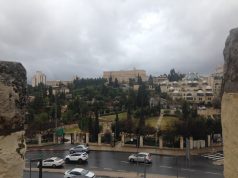This was written as my wife and I are making our first trip to Israel. It is one of a series of pieces I’ve been sending home to friends and family who expressed a desire to hear about my experiences and impressions.
I’m not a military sort of a guy. To me, it is something of a turnoff that — in the area where we live in Virginia — so many of the schools are named after Confederate generals, that a soldier in that culture is more honored than a teacher, and that in the nation at large in our times there has been so much glorification of our “heroes” in uniform over all other parts of our cultural ideals.
So I’ve been surprised at how positive my reactions have been to the IDF as a part of Israeli culture.
My experiences have been, admittedly, only a glance into a very large and doubtless complex cultural and political reality. Mostly, they have consisted of contacts with Israeli soldiers. For example, when we visited Yad Vashem, a large proportion of the other visitors were groups of men and women in uniform.
At Yad Vashem, I entered into conversation with a young man in uniform — early 20s, blond and fair-skinned, well over six feet tall– carrying an Uzi and wearing a turquoise-colored cloth under a strap on his shoulder (which, I later learned, signified that his unit is in the artillery). I asked him why so many soldiers were there at Yad Vashem.
(I observed that only a small proportion of them were carrying weapons, so it seemed unlikely they were playing any protective role.)
He explained: The IDF regards an important part of its mission as educational. In training its recruits, the IDF seeks to make sure that their soldiers understand their purpose as soldiers in the broad context of the history of their nation and their people.
It seems fitting that the IDF functions in part as an educational institution for these young men and women. Unlike for us in the U.S., service in the military is something into which all the young men and women are drafted upon reaching the age where, in the U.S., many go straight from high school into college.
(Nearly all: I won’t go into the exemptions for many orthodox youth, and what that reflects about the excessive power of religious parties, deriving from the requirements of coalition-building in Israel’s parliamentary system.)
Later, near the Jaffa Gate, I again encountered such soldiers grouping for visits into the Old City. Again, I asked one of the soldiers why he and his comrades were there. And again, I got an answer that it was so that the soldiers would understand the history of what it is — the people/nation/society/culture – that it will be their mission to protect.
As one who came of age at the time of the Vietnam war – which gave the idea of service in the military, for me and so many others of my generation, such a different feeling than it had for our fathers’ generation who had to fight in World War II – the end of the draft in the early 1970s seemed a welcome development.
So it has been surprising, for me here in Israel, to respond to the IDF with its (near) universal conscription in such a positive way.
For one thing, the feeling one gets from seeing the assembled soldiers is different here in part because these young people are such a cross-section of the whole society. A great many of these Israeli soldiers seem bright and –so far as I can tell –one does not have to look far to find a more complex mentality than I’ve generally experienced in recent decades in interaction with American soldiers.
But perhaps more important, there is a kind of solidarity among the people – a sense of common purpose.
We Americans, it seems to me, have substantially lost such a sense of common purpose and values since, say, World War II and, more recently, since the time when we as a nation first began speaking of our country as “the leader of the free world.”
(Of course, with Trump, we are nothing of the kind. But even before Trump, that sense of common purpose seems to have quietly slipped away over the years.)
The IDF as an educational institution, providing its young with some understanding of the long and harrowing history that has led to the creation of this “Jewish state,” seems a profound thing.
And the IDF seems to have maintained some sense of the humane values that its own founders brought to the Zionist project. [See the note, below.]
The “educational” role also has another dimension: I learned yesterday that every soldier – male and female – upon completing their time in the IDF is offered a grant to help them build a future. For those not in combat units, we were told by our new friend here in Haifa, it is enough to pay tuition for their first year in college. (Or, alternatively, to help them start a business.) For those who served in combat units, the grant is sufficient to pay for the entire college education.
What one hears frequently about how the Israeli people as a whole relate to all of their soldiers as “our children” – I’ve read that over the years, and heard it twice now directly from Israelis with whom I’ve spoken – really bespeaks a nation that has made itself more than the sum of its individualistic parts.
I’ve asked myself whether the United States could make of its military — or more broadly of some sort of national service system — something that could perform something of the same role.
(“Cvics” education in our schools was never really the same thing, but it was something. But I gather that, nationwide, American schools impart precious little of even that anymore.)
It seems more straight-forward to build that kind of solidarity of shared values and purpose in a society that was built by people coming out of millennia of persecution, out of the Holocaust, and continually surrounded by people who don’t want their nation to exist. Such things are powerful drivers toward solidarity.
In the U.S., thank God-or-whatever, we do not have such powerful drivers. So could it be accomplished in some other way? E pluribus unum is easy to say, harder to achieve.
But we do, as a nation, have some basic values embedded in our nation. They are what immigrants learn about when they study to become American citizens. They are the ideals that are embedded in the Constitution our Founders wrote.
So while there is no American version of Yad Vashem, there is a meaning to America. And it is a meaning that – as recent developments demonstrate – we lose touch with to our peril.
Of course, in neither the United States nor in Israel – being directed as they are by human beings who are flawed working in power systems that are subject to corruption – are the uses of the military always faithful to the ideals of the nation.
(In the U.S., we seem to have become way too glib about how every use to which our soldiers are put is about “defending our freedom.” And not every use of the IDF looks to me well-suited to making sure that catastrophe befalls the Jews “Never again,” nor to honoring the values on which the state was founded.)
But both nations are, more than most others, founded on ideals and values and an image of a better way of organizing human life. They are not, as with so many other nations, just derived from a history of the peoples of a given geographical area being brought, through centuries of war, under the aegis of a consolidating power.
And Israel seems to me to have structured how it brings its young into the nation, into the service to the nation, into the protection of the nation, in a way that is positive and meaningful.
And, as one who has lamented some key aspects of how Israeli policy has lately evolved, I feel surprisingly good about what I’ve seen of the role of the IDF as a socializing institution in Israeli society.
Not all that I’ve seen has felt good to see.
It is uncomfortable to see two IDF soldiers, outside the Damascus Gate to the Old City, carefully frisking a young Arab man who is wearing a great many layers (under which, I assume the fear was, there might have explosives hidden). It is awkward, and it is clearly not the best way to make friends and influence people.
But I don’t have reason to claim those soldiers were acting wrongly. There are realities that need to be dealt with—at least until such time (may it someday come!) that these peoples have found a way to create better realities.
In the not distant future, I will be sharing another piece that begins with how challenging it is to write home about Israel to a group of people whose attitudes toward this Jewish state span a considerable spectrum. In that piece, I will articulate the main lines of how I see this complex situation.
About that, later.
***************************
Note about the humanistic/ethical dimension of the IDF culture: Consider for example what one person on this list reported to me last week regarding a talk she attended by an IDF solider:
He pulled out of his shirt pocket a tripartite card which he told us was a statement of the ethics of a soldier. All soldiers in the IDF are required to carry this card in their pocket at all times. The first was protection of others, the second had to do with loyalty, and the third had to do with humanity. It was on the third topic that he spoke. Many of the instructions to soldiers had to do with their responsibility to preserve all human life. He talked about the incident, which I am sure you know about, of the soldier named Azaria who was convicted by an Israeli [military] court. He told the whole sequence of events in great detail, Pointing out the various events where the soldier had not followed the rules. In particular, the soldier had not paid attention to the clearly documented situation in which the Palestinian was no longer a threat.
I think it is noteworthy that, in the case referred to above, it was a military court that was determined to uphold a strong ethical standard for the use of force. (If one is authorized to use such deadly force, a moral discipline is required. Personal feelings of a desire for revenge are an unacceptable violation of that discipline.) It was the politicians – mostly from the ruling Netanyahu coalition, I believe – who objected to the soldier being prosecuted for killing an already “neutralized” terrorist.










![Saturday News: “Trump’s latest tariff TACO probably won’t make your life more affordable”; “The Epstein Email Cache: 2,300 Messages, Many of Which Mention Trump”; “[MTG] questions if Trump is still the ‘America First’ president”; “Jim Ryan tells all: ‘What did the Governor know, when did he know it?’”](https://bluevirginia.us/wp-content/uploads/2025/11/montage1115-100x75.jpg)

